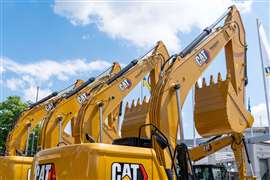Automatic hitches gain ground as semi-automatic versions come under review.
21 November 2008

Ten years ago, around 10% of the excavators in use in the UK were fitted with some form of quick hitch or quick coupler. Today that figure is closer to 80%. Indeed, below 20 t operating weight it is probably closer to 100%, according to coupler and bucket supplier Miller.
Being able to use a range of buckets and powered attachments with an excavator, even with a mini excavator, greatly increases the machine's versatility and boosts utilisation, raising profitability for a rental company. Not having to hammer out pins every time you change between implements cuts downtime and allows an operator to rapidly change between buckets and attachments for specific tasks.
The UK is not alone in spotting the advantages of the quick coupler. Many European countries have moved to quick hitches, and they are increasingly popular in the US rental market.
However, where in the UK quick couplers tend to be in effect pin grabbers, locking around any existing bucket pins that are already fitted to the buckets and attachments, in markets such as Germany around 95% of couplers are dedicated to a machine and bucket type. In France the market is split 50/50 between dedicated hitches and pin grabbers, while the US rental business has moved mainly to pin grabbing couplers.
Traditional manual quick couplers require an operator to jump out of the cab to remove locking pins and refit after the attachment has been changed. Semi-automatic couplers remove much of that manual work, requiring just one or two locking pins to be set by an operator. The latest fully automatic hitches allow the operator to change buckets without leaving the cab, automatically locking in place once the pins have been located.
However there have recently been a number of cases where the locking pins on semi-automatic couplers have not been correctly fitted. The result has been buckets and attachments falling off machines while in use, and in the worst cases killing operatives on site.
"In the 12 month period up to September 2007 there were four fatalities in the UK," says Tim Faithful, director of member services at the Construction Equipment Association, the UK group that looks after the interests of equipment manufacturers. "In each case the operator had failed to put the locking pin in correctly. Most people agree that the semi-automatic hitch is unsafe if people don't follow the instructions."
The problem for a rental company of course is that they might not have any dialogue with the actual operator of the machine, so there is no way of checking that the driver has read the necessary operating instructions and is happy to use the hitch correctly.
There are 27 quick coupler manufacturers in the UK and Ireland alone, many more on the Continent. The UK's Health and Safety Executive (HSE) has now written to those UK and Irish manufacturers asking them to withdraw any semi-automatic couplers from the market by October 1, 2008. After that date the ban will be enforced.
This decision cannot be applied retrospectively, so any company already using semi-automatic hitches can carry on with them, though their customers might not want to have them on site once the ban is in place.
"We're amending the European Standard to include quick hitches, that would put most semi-automatic hitches out of scope," says Mr Faithful.
The European Directive EN474-1 allows a member country to implement additional regulations in this way, and following meetings in Europe and elsewhere, international standards organisation ISO has agreed to look at revisions to the Directive. However as that could take up to three years to implement, the HSE has decided to take steps now in the UK.
While there are many manufacturers in this market, Miller is perhaps the biggest, claiming around 75% of the UK market and sold as original equipment by many manufacturers, including JCB and Caterpillar. Around 5000 of Miller's couplers are sold each year in the USA under the Caterpillar brand, while a further 1000 hitches are supplied to US customers through ESCO. Cat also offers its Connect'o'maat system, which is a dedicated type quick-coupler that the firm has been offering for more than 30 years.
One of Miller's most successful products has been the Bug coupler, which is a fully automatic hitch that will work with buckets from most leading excavator brands. However this year Miller moved the market forward again with the introduction of the TwinLock, introduced at Conexpo.
Miller's TwinLock hitch is a fully auto coupler that has a front latch that can be clearly seen from the machine cab. This ensures that the operator is always aware of the locking position, and in the unlikely event of a loss of engagement force in the hitch, two gravity operated mechanical stops prevent the bucket from falling off the machine.
Of course there is a cost implication to fully automatic coupling. Miller's Steven Ford says that customers can expect to pay 10-15% more for a fully auto hitch. This is perhaps why he says that Miller, along with other manufacturers, will continue to produce semi-automatic hitches for those countries where they remain popular, though they will no longer be sold in the UK.
For the full belt and braces approach there are more advanced systems available. Liebherr's Likufix hitch is an example of a dedicated quick coupler that offers more than simple bucket location. Not only does the Likufix coupler change between attachment pins, but it also offers automatic connection of hydraulic and electrical lines too.
Likufix can be added to any Liebherr quick hitch adaptor and attachment and is available for excavators in the 10-125 t range. Customers can fit the system to a wide range of attachments including breakers, sorting grapples, shears, multi-tine grabs and pulverisers, making them an ideal solution for demolition contractors in particular.
A hydro-mechanical system ensures a safe and leak-free connection of hydraulic hoses. The connection process is carried out automatically as the coupler locks into the pins.
Whatever system you choose to employ, one thing is clear, operators need to be confident about how to safely use the quick coupler, and must be sure that the bucket or implement is securely attached to the machine.
Every operator must have seen a bucket fall off an excavator at some time in the past. Fortunately most of them simply drop to the ground without causing any damage. However nobody wants to see operatives being injured, or worse still fatally wounded, on their construction sites.
Site managers have to be conversant with the latest health and safety legislation and many continually audit accidents and safety on their sites, applying risk assessment techniques to reduce incidents. If they see that the HSE in the UK is banning semi-automatic quick couplers, under duty of care legislation they may well feel compelled to do the same.
As mentioned, the regulations are not going to be retrospective. Rental companies with existing semi-automatic hitches will still be able to use them in the UK. However customer demand may prove to be as effective as legislation in changing buying habits.






